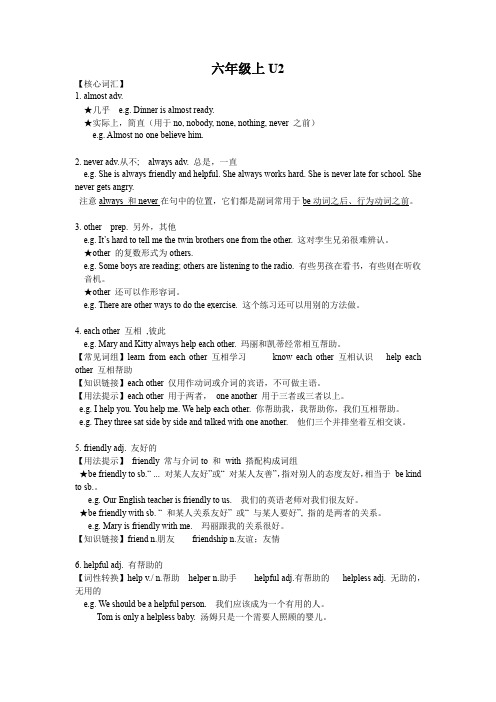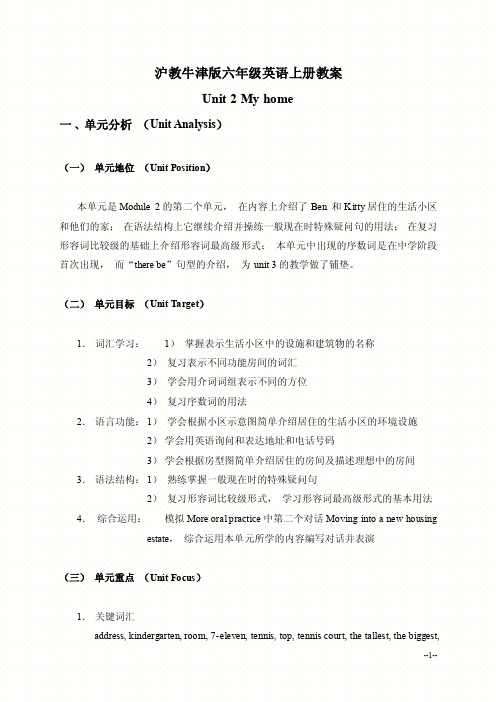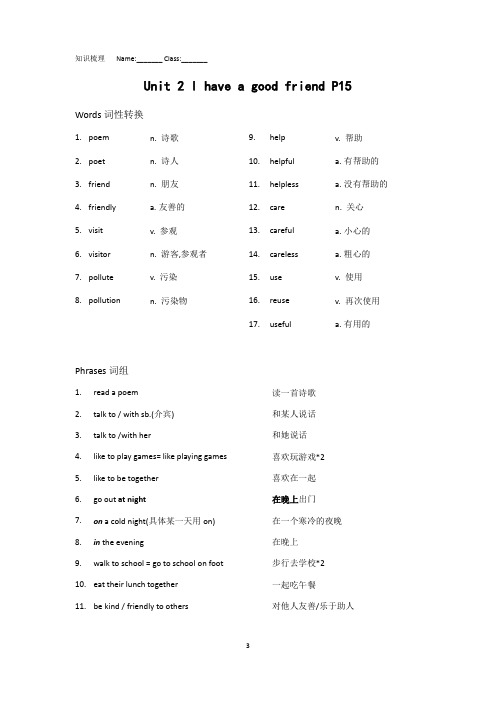上海版牛津英语六年级上unit unit2课本解析
牛津沪教版英语六年级上6A-Unit2

六年级上U2【核心词汇】1. almost adv.★几乎 e.g. Dinner is almost ready.★实际上,简直(用于no, nobody, none, nothing, never 之前)e.g. Almost no one believe him.2. never adv.从不; always adv. 总是,一直e.g. She is always friendly and helpful. She always works hard. She is never late for school. She never gets angry.注意always 和never在句中的位置,它们都是副词常用于be动词之后、行为动词之前。
3. other prep. 另外,其他e.g. It’s hard to tell me the twin brothers one from the other. 这对孪生兄弟很难辨认。
★other 的复数形式为others.e.g. Some boys are reading; others are listening to the radio. 有些男孩在看书,有些则在听收音机。
★other 还可以作形容词。
e.g. There are other ways to do the exercise. 这个练习还可以用别的方法做。
4. each other 互相,彼此e.g. Mary and Kitty always help each other. 玛丽和凯蒂经常相互帮助。
【常见词组】learn from each other 互相学习know each other 互相认识help each other 互相帮助【知识链接】each other 仅用作动词或介词的宾语,不可做主语。
【用法提示】each other 用于两者,one another 用于三者或三者以上。
牛津上海英语六年级上册 Unit2(共17张PPT).

5-3
pollute / :/
Sometimes people pollute the environment. We have air pollution, water pollution and land pollution.
12345
5-4
Friends of the Earth help keep the environment clean. They pick up rubbish.
12345
5-5
leave /li:v/
They put rubbish into rubbish bins and tell people not to leave rubbish.
12345
Answer
• What is the environment?
The environment is all the things round us.
promproimseisess
We promise to … We promise not to …
walk on grass leave rubbish
in the park
feed the birds
put rubbish in the bins
Friends of the Earth
Friends of the Earth is an organization.
/\ :W /
environment / /
Chapter 2 What is environment
sea
plants
land // air
1 2 3 4 5 6 7 8 9 10 11
promproimseisess
(沪教牛津版)六年级英语上册教案Module2Unit2(2)

沪教牛津版六年级英语上册教案Unit 2 My home一、单元分析(Unit Analysis)(一)单元地位(Unit Position)本单元是Module 2的第二个单元,在内容上介绍了Ben 和Kitty居住的生活小区和他们的家;在语法结构上它继续介绍并操练一般现在时特殊疑问句的用法;在复习形容词比较级的基础上介绍形容词最高级形式;本单元中出现的序数词是在中学阶段首次出现,而“there be”句型的介绍,为unit 3的教学做了铺垫。
(二)单元目标(Unit Target)1.词汇学习:1)掌握表示生活小区中的设施和建筑物的名称2)复习表示不同功能房间的词汇3)学会用介词词组表示不同的方位4)复习序数词的用法2.语言功能: 1)学会根据小区示意图简单介绍居住的生活小区的环境设施2)学会用英语询问和表达地址和电话号码3)学会根据房型图简单介绍居住的房间及描述理想中的房间3.语法结构: 1)熟练掌握一般现在时的特殊疑问句2)复习形容词比较级形式,学习形容词最高级形式的基本用法4.综合运用:模拟More oral practice中第二个对话Moving into a new housing estate,综合运用本单元所学的内容编写对话并表演(三)单元重点(Unit Focus)1.关键词汇address, kindergarten, room, 7-eleven, tennis, top, tennis court, the tallest, the biggest,live in a housing estate / Block___ , live on the ___ floor , live at (address) 2. 语言功能1) Description 描述居住情况Describing a housing estateDescribing a flat1.Asking for information询问信息● A: Where is the fountain?B: It is in front of Block 1.● A: Where are the tennis courts?B: They are behind the swimming pool.● A: What’s Eddie Chen’s addressB: He lives at Flat 18B, Block2, Rose Garden Estate, Garden City . ● A: What’s his telephone number?B: It’s 6376 9711.● A: How many flats are there in your block?B: There are ….● Which floor do you live on? 2.Comparison进行比较a) Who lives in the tallest block?b) It’s the biggest flat.3. 语法要点1) 一般现在时的肯定句:They live in Block 1. Eddie lives in Block 2.I live at … (address).He lives at … (address).They live in Block 1. It has 30floors. They live on the ninth floor.There are shops, a school, … a swimming pool and tennis courts in the housing estate.We live in Flat A. It has eight rooms. It’s the biggest flat.This flat is small. There are … bedrooms, … sitting rooms … in this flat.2)一般现在时的特殊疑问句:Where does Eddie live? Where do Ben and Kitty live?Where is the fountain? Where are the tennis courts?What’s Eddie Chen’s address?What’s your address?What’s his telephone number?What’s your telephone number?How many blocks are there in your housing estate?Which floor do you live in?3)形容词最高级:Who lives in the tallest block?It’s the biggest flat.4)序数词:tenth, eighteenth, ninth5)介词:in, at, in front of, behind, near, on the right of, on the left of二、教学设计(T eaching Designs)教学内容教学实施建议教学资料参考P22 Look and learnP25 Look and learn用图片引出新单词或词组,通过两个词汇学习的活动操练或复习这些单词或词组。
六年级上册英语第二单元讲解

六年级上册英语第二单元讲解六年级上册英语第二单元的讲解可能会因教材版本和具体内容而异。
以下是一个基本的讲解框架,您可以根据教材的具体内容进行调整:一、单元概述本单元将介绍一些关于爱好和日常活动的表达方式,以及相关的词汇和语法。
学生将通过听说读写等多种形式来练习表达自己的爱好和日常活动,并了解其他人的爱好和日常活动。
二、重点知识点词汇:本单元将学习一些关于爱好和日常活动的词汇,如“reading”、“swimming”、“shopping”等。
学生需要掌握这些词汇的拼写、发音和意思。
语法:本单元将涉及一般现在时态,主要表示习惯或常规的动作或状态。
学生需要掌握一般现在时态的基本用法,以及动词第三人称单数的变化规则。
表达方式:本单元将介绍一些关于爱好和日常活动的表达方式,如“I like doing sth”、“He/She likes doing sth”等。
学生需要掌握这些表达方式的用法,并能够根据实际情况进行运用。
三、教学方法建议创设情境:教师可以根据教材内容创设情境,如学校兴趣小组、家庭日常活动等,让学生在实际情境中运用所学知识。
听说领先:在词汇和表达方式的学习中,教师可以先从听开始,让学生通过听力材料熟悉词汇和表达方式,然后再进行口语练习。
读写结合:教师可以根据教材内容安排相应的阅读和写作任务,让学生在实践中掌握所学知识。
个性化学习:教师可以根据学生的实际情况和兴趣爱好,安排个性化的学习任务,如制作个人爱好手册、写一篇关于自己日常活动的文章等。
四、教学评价建议课堂表现:教师可以观察学生在课堂上的表现,包括参与度、注意力、表达能力等方面,给予相应的评价。
作业完成情况:教师可以根据学生的作业完成情况,包括书写规范、正确率等方面进行评价。
Unit2课件牛津上海版英语六年级上学期

Two. • be friendly to sb.=be kind to sb. • 对……友好 • be friendly with sb.和某人关系好
9
单词解析
词组解析
语法夯实
• 【知识拓展】 • friendly常ly to sb.的意思是“对某人友好”或“对某人
11
单词解析
词组解析
语法夯实
For example
Would you be kind to help me?
n. 种类
I like all kinds of fruit.
12
单词解析
词组解析
语法夯实
For example
1) 淘气的 He is a naughty boy. 2) (用隐晦的低级语言) 刺激人的,低级的
• 【辨析】almost 可以与no, none, never以及 • nothing等不定代词连用,而nearly则不可 • nearly 在not的否定句中,而almost 不可以。 • She is not nearly as pretty as her sister.
3
单词解析
词组解析
语法夯实
6
【中考链接】用括号中所给单词的适当形式填空。
• Some people like reading on Wechat, but ____ don’t. (other)
沪教牛津版六年级上册英语Unit2第2课时教学课件

科 目:英语 适用版本:沪教牛津版 适用范围:【教师教学】
Unit 2 My summer holiday
第一页,共十七页。
单词:
everyone; countryside; pick 句型: She enjoyed her summer holiday.
A. do
B. did
C.does
2.—Where ______ you last night? — I ______ in the study.
A. are; am
B. were; was
C. were; were
3. I often my homework at 7, but yesterday I
第十页,共十七页。
enjoy意为“喜欢;享受”,后面可以接名词和动词。 当enjoy后面接动词时,动词需要用-ing形式。
例 He enjoys listening to music. 他喜欢听音乐。
第十一页,共十七页。
Hi Kitty,
I am having a good time in Bei.jing I came here by plane last Sunday. I visited my uncle ,Tian'anmen
Museum. Everyone had a good time.
第六页,共十七页。
During the summer holiday, Jill stayed with her grandparents in the countryside. She picked
apples with her grandparents.
2022-2023学年上海牛津版英语六年级上册Unit 2 知识点梳理

6AU2 知识点梳理Review1. I always talk to her.talk to/with sb.talk about sth. with sb. = discuss sth. with sb.2. But she doesn’t talk at all.= But she never talks.not … at all = never 完全不区分:not at all 与not ... at all- Thank you. – Not at all.3. She likes to play.like to do sth. (少用) = like doing sth. = enjoy doing sth. 4. She can’t read or write. (否)肯: She can read and write.5. And she is only three.(adv.)Exercise: 区分以下only修饰的内容。
a. Only Tom watches TV at home on Sunday.b. Tom only watches TV at home on Sunday.c. Tom watches only TV at home on Sunday.d. Tom watches TV only at home on Sunday.e. Tom watches TV at home only on Sunday.Grammar1.We go to the park almost every day.almost /'ɔːlməʊst/ (adv.) ≈ nearlye.g. Almost no one believes him.e.g. He eats almost everything.2. We go to the park almost every day.every day/week/month/year… (adv.)everyday (adj.) = daily 每日的e.g. everyday life/newsExercise:I play the trumpet __________ (everyday/every day). Answer: every day3. She sometimes watches TV and never goes out at night. go out – come in4. She sometimes watches TV and never goes out at night. at night/noonin the morning/afternoon/eveningon Sunday/Monday* on Saturday morning, on a cold morningRules:at + a point of time (时间点)(at noon / at midnight = at 12 o’clock)in + a period of time (时间段)on + day (具体一天)5.Alice and Kitty are good friends.= Alice is Kitty’s good friend.good friend – best friend (最高级)→ friendship (n.) 友情Suffix(后缀):-ship: a state or condition 一种状态friend + ship=friendshiprelation + ship=relationshipfriendly (adj.) = kind Ant: unfriendly = unkindbe friendly to sb. = be kind to sb.e.g. Alice is always friendly to others.6. They like to be together. /tə'geðə/(adj.)They walk to school together.(adv.)7. They help each other.one…the other: (两者) 一个...剩余另一个one…another: (三者及以上) 一个...其他另一个e.g. one hand … the other hande.g. one student … another student in the classeach other: 互相learn from each other 互相学习8. help (v.)e.g. help other people = help othershelp sb. = give sb. a hand = do sb. a favour Exercise:Can you help me?= Can you _______ me _______ _______?= Can you _______ me _______ _______?Answer:give, a hand; do, a favourhelp sb. (to) do sth. = help sb. with sth.Exercise:I sometimes help my mother do the housework.= I sometimes help my mother _______ the housework. Answer: with→ helpful (adj.) 有帮助的– helpless (adj.) 无助的be helpful to sb. 对某人来说是有帮助的e.g. English dictionary is very helpful to us.→ helper (n.) 帮手,助手9. They always walk to school together.= They always go to school on foot together.go to sp. on foot = walk to sp.类似用法:go to sp. by car = drive to sp.go to sp. by plane = fly to sp.go to sp. by bike = cycle to sp.10. They always eat their lunch together and always share their food. They always share their food with each other.share (v.) ① 分享share sth. with sb.e.g. Can you share your book with me?② 共用e.g. Can you share your book with your deskmate?*③ 有同样的感情(或想法、经历等)share a common interest 有共同的兴趣爱好11.She always works hard. (adv.)hardworking (adj.) 刻苦的→ a hardworking studentExercise:He works hard.= He is ____________.Answer: hardworking→hard (adj.)① 硬的:Hard Rock② 难的:a hard task = a difficult task→hardly (adv.) = almost note.g. I hardly know you.12.She is never late for school.频度副词位置:be动词后,行为动词前① be late (adj.) for school/class/work② I sometimes get up late at weekends.(adv.)She never gets angry.get:① get … from … = receive … from …② get angry/tired/… = become angry/ tired/…be, get, become (系动词)+ adj.Differentiate(区分):be angry & get angryhave & have got状态& 动作13.angry (adj.) – angrily (adv.)14.She is always kind to others.others = other peoplebe kind to sb. = be friendly to sb.15.She never tells lies.lie:(n.) 谎言tell lies/ tell a lie(v.) ① 说谎lie to sb.② 躺下lie downe.g. I only want to lie in bed at weekends.lie – lyingDifferentiate: Tell, Say, Speak, Talk① tell: to give information to a person 告诉;要求e.g. He is telling the children a story.tell sb. to do sth.e.g. Tell him to come to my office.② say: to express something using words 说(强调说话内容)say sth. (to sb.)e.g. He says, ‘Would you like some coffee?’e.g. He can say his name in English.③ speak: 说、讲(强调说话动作,而非内容)speak to/with sb.e.g. Can I speak to you?speak + languagee.g. I can speak Chinese, English, Korean, Japanese and French.④ talk:谈论、聊天talk to/with sb. about sth. = discuss sth. with sb.speak和talk经常可以互换,speak只是比talk更正式些16.现在完成时(present perfect tense):- Have you been to Ocean Park yet?- No, I haven’t been to Ocean Park yet.- I’ve just been to Garden City Zoo.- I’ve already been there.1)have been to 的意思是_________。
牛津上海版六年级上册Unit 2 I have a good friend知识梳理

Unit 2 I have a good friend P15 Words词性转换1.poem n. 诗歌9.help v. 帮助2.poet n. 诗人10.helpful a.有帮助的3.friend n. 朋友11.helpless a.没有帮助的4.friendly a.友善的12.care n. 关心5.visit v. 参观13.careful a.小心的6.visitor n. 游客,参观者14.careless a.粗心的7.pollute v. 污染e v. 使用8.pollution n. 污染物16.reuse v. 再次使用eful a.有用的Phrases词组1.r ead a poem读一首诗歌2.t alk to / with sb.(介宾)和某人说话3.t alk to /with her 和她说话4.l ike to play games= like playing games喜欢玩游戏*25.l ike to be together喜欢在一起6.g o out at night在晚上出门7.o n a cold night(具体某一天用on)在一个寒冷的夜晚8.i n the evening在晚上9.w alk to school = go to school on foot步行去学校*210.e at their lunch together一起吃午餐11.b e kind / friendly to others对他人友善/乐于助人12.s hare their food分享他们的食物13.h elp each other互相帮助14.h elp other people帮助其他人15.b e late for school / class上学/上课迟到16.g et angry变得生气的17.n ever tell lies从不说谎18.w ork hard努力工作学习19.l ive in the USA = live in America住在美国*220.h ave / has been to sp.去过某地21.h ave / has been there去过那里22.v isit Shanghai for the first time第一次参观上海23.a sk sb. about sth.(介宾)询问某人某事24.a sk sb. (not) to do sth.叫某人(不要)做某事25.F riends of the Earth地球之友(作专有名词使用)26.l ook after the environment照看环境27.t ake care of the environment照看环境28.p ollute the environment污染环境29.a ir / water / land / light pollution空气/水/土地/光污染30.k eep sth. + a.使某物保持一种状态31.k eep the environment clean保护环境干净32.p ick up rubbish捡起垃圾33.p ick it up (代中)把它捡起来34.p ick flowers摘花35.p ut rubbish into rubbish bin把垃圾扔进垃圾箱36.t ell sb. (not) to do sth.告诉某人(不要)做某事37.l eave rubbish遗留垃圾38.p romise (not) to do sth.许诺(不会)做某事39.p romise to keep our school clean许诺保持校园干净40.p romise not to leave rubbish许诺不遗留垃圾41.r euse shopping bags重复使用购物袋42.a useful book一本有用的书43.k eep our promises遵守我们的诺言Point sentences重点句子44.She doesn’t talk at all. = She never talks. 她从不说话。
- 1、下载文档前请自行甄别文档内容的完整性,平台不提供额外的编辑、内容补充、找答案等附加服务。
- 2、"仅部分预览"的文档,不可在线预览部分如存在完整性等问题,可反馈申请退款(可完整预览的文档不适用该条件!)。
- 3、如文档侵犯您的权益,请联系客服反馈,我们会尽快为您处理(人工客服工作时间:9:00-18:30)。
1.Alice has got a lot of presents and birthday cards from her family and relatives.(1)...have got...I think I have got one.现在完成时结构have got在口语中相当于一般现在时have的意义,表示“有”。
不过,在美国英语中常用have,而在英国英语中则常用have got。
他有一个兄弟。
He has got a brother.(英式)=He has a brother.(美式)◆现在完成时结构只有一种疑问方式,即:Have/Has...got...?◆而一般现在时结构有两种疑问方式,即:Do/Does...have...?或Have /Has...?你有一把雨伞吗?①Have you got an umbrella?②Do you have an umbrella?③Have you an umbrella?注意这两种结构疑问句的回答略有不同。
①—Have you got a dictionary?—Yes,I have./No,I haven't.②—Do you have a dictionary?—Yes,I do./No,Idon't.考点链接1.Do you have a motorbike?(同义句)→ you a motorbike?2.I don't have a mobile phone like that.→I a mobile phone like that.(2) a lot of = lots of +可数名词复数/不可数名词I have a lot of friends.= I have lots of friends.There is a lot of water in the glass . = There is lots of water in the glass.(3) 介词from2.How many uncles do you have?How many+可数名词复数+do/does+主语+have(how many在句首,名词复数跟着走)How many的用法:1)there be句型中主语的数量,如some,five,only one等提问时,如果是可数名词,不管是单是复都当复,因为说话人不知道具体的数量,而many只能接可数名词复数,所以be一定要用areHow many+可数名词复数+are there+地点或时间状语There is a book on the desk. How many books are there on the desk?There are seven days in a week. How many days are there in a week?How much的用法:1)询问事物的数量,接不可数名词How much milk is there in the glass2)询问事物的重量 How much does the pig weigh?3)多少钱 How much is the eraser?4)询问数字计算的结果,相当于what. How much is three plus one?1. ____________ meat do you eat every week?2. ____________ students are there in your class?3.________ the pants? They’re15 yuan.A.How many is B.How man y are C.How much is D.How much are 3.I usually go shopping with my aunt.(1) always 总是usually 通常often 经常sometimes有时候 never从不表示频率,在句中可看做是插入语。
Eg: He always does his homework carefully.I often go to my grandmother’s house in the weekends.(2) go + V-ing 去做某事go shopping 去购物go cycling 去骑车Go swimming 去游泳(3) with sb 和某人一起。
with后接人称代词时,用宾格形式with用法归纳“用……”表示使用工具,手段等。
例如:①We can walk with our legs and feet. 我们用腿脚行走。
②He writes with a pencil. 他用铅笔写。
“和……在一起”,表示伴随。
例如:①Can you go to the park with me? 你能和我一起去公园吗?②He often goes to the library with Jenny. 他常和詹妮一起去图书馆。
③She lives with her son. 她和儿子住在一起。
“与……”。
例如:I’d like to have a talk with you. 我很想和你说句话。
“关于,对于”,表示一种关系或适应范围。
例如:What’s wrong with your watch? 你的手表怎么了?“带有,具有”。
例如:①He’s a tall kid with short hair. 他是个长着一头短发的高个子小孩。
②They have no money with them. 他们没带钱。
“在……方面”。
例如:Kate helps me with my English. 凯特帮我学英语。
4.—— Have you been to Ocean Park yet?——Yes, I have already/just been to…/been there.No, I haven’t been to…/been there yet.already,just多用于肯定句中,ever,yet,never多用于疑问句和否定句中。
.already意思是“已经”①通常用于陈述句中(放在have和has的后面)②也可用于疑问句,表示期望得到肯定的回答或表示惊异,此时already常在句末。
She has already found her bike. Has she found her bike already?她已经找到自行车了?yet用法①yet可用于否定句,此时译为“还”;I haven’t found my ruler yet.②也可以用于疑问句,译为“已经”(放在have和has的后面也可放在句末)Have you found your ruler yet?你已经找到尺子了吗?just只用于陈述句意思是“刚才”(放在have和has的后面)I have just received a letter.never用于否定句译为“从不”(放在have和has的后面)I’ve never been to Beijing.ever用于疑问句译曾经”(放在have,has的后面)Have you ever been to Beijing?练习:根据汉语提示用适当词的合适形式填空。
1.I have __________ finished my homework.我已经做完家庭作业了。
2.He ______________ had his meal.他刚吃过饭。
3. _________ you ________ sung this English song?你曾唱过这首英文歌吗?4.They __________ started _________ .他们还没有动身。
5.We ____________ heard of it.我们从来没有听说过这件事。
6. The plane ______________ arrived . 飞机已经来了。
7. I ______________ been to the post office. 我刚才去邮局了。
8. Mary _______________ been to the Great Wall. 玛丽从未去过长城。
have been to 来过,去过(人已经回来了)have gone to 去或到某地了(人还没回来)注意:遇到四个地点副词时,去掉to (here, there, home, abroad)练习:用have been to,have gone to 填空1)Where is Jim? He ______________ to Beijing.2) She has ________ to the park.She will be back in two hours.3) I have ________ to the West Lake. Look, I have taken many photos on it.4) The Whites have _______ to the USA.They won’t come back.5) I have ______ to Hong Kong twice.6) Tom has ______ to the WC, so I have to wait for him.7) How many times have you _______ to Shanghai.8) I like the Great Wall, so I have ______ there many times this month.9) Sally isn’t at home, she has ________ to Japan.10) The Blacks ar en’t in Shanghai. They have ________ to Beijing together.短语:1. go shopping with my aunt 和我的阿姨去购物2.help each other 互相帮助3. be friendly to sb.对某人友好= be kind to sb4. be late for 迟到5. get angry 生气6.share her food with me 和我一起分享她的食物7.live in 住在8.ask sb about sth 询问某人关于某事ask sb to do sth 让某人做某事 ask sb not to do sth 让某人不要做某事tell sb to do sth 告诉某人做某事 tell sb not to do sth 告诉某人不要做某事promise to do sth 承诺做某事 promise not to do sth 承诺不做某事9.What about (= how about)怎么样 (加 doing)10.talk about 谈论 talk with sb 和某人谈话,talk to sb.和某人谈话11. keep the environment clean 保持环境干净12.look after 照顾(= take care of )13.discuss it with your classmates 和你的同学讨论。
